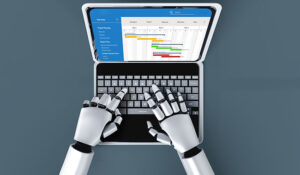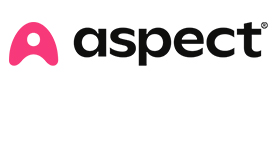Daniella Deloatch at Aspect outlines some of the key benefits of AI in workforce scheduling and how AI philosophy is guiding our development of workforce management software for the future.
It’s no secret that AI is transforming workforce management processes, including scheduling. As AI workforce scheduling solutions are integrated into workplaces, processes are becoming automated, flexible, and more accurate-benefitting both managers and employees.
The drive for efficiency gains has accelerated the adoption of AI workforce scheduling tools, with 78% of organizations using AI for at least one business function, up from 55% in 2023, according to a McKinsey report.
The Landscape of Workforce Scheduling
Before AI-supported workforce scheduling was introduced, traditional workforce scheduling processes were rooted in manual work, sometimes proving ineffective for large, dynamic workforces.
Inefficient scheduling directly impacts workforce performance. It leads to inadequate staffing levels while causing available employees to become overworked and stressed.
This ultimately degrades service and work quality, negatively affecting a business’s bottom line and driving managers to seek performance improvements.
Proactive, data-driven workforce scheduling with AI capabilities is a key driver of modern workforce management success.
AI Technologies Powering Intelligent Scheduling
How is AI transforming workforce scheduling? Managers exploring AI scheduling solutions will discover powerful technologies that drive automation and boost efficiency through:
- Pattern recognition – Machine learning algorithms identify scheduling trends from historical data that would be missed during manual review, providing more accurate scheduling suggestions.
- Assisted request management – Natural language processing is being implemented to improve scheduling processes, including AI assistants in self-service scheduling and request management workflows.
- Predictive analytics – AI-powered workforce solutions enhance the accuracy of forecasting and staffing through predictive analytics.
- Optimization algorithms – AI workforce scheduling tools utilize advanced algorithms that balance competing priorities, such as employee preferences and business requirements, to create optimal schedules that satisfy both parties.
Key Benefits of AI-Driven Workforce Scheduling
AI-driven solutions deliver significant benefits for both businesses and employees by filling operational gaps, automating complex processes, increasing scheduling accuracy, and saving valuable time.
Benefits For Businesses
Organizations are increasingly discovering compelling business cases for implementing AI solutions. Key benefits include:
Increased Operational Efficiency and Cost Savings
Intelligent workforce scheduling improves workflows, saving time and ultimately, money. According to McKinsey research, the majority of organizations that use Gen AI in most business functions reported cost reductions.
Improved Compliance With Labour Laws and Regulations
Relying on manually tracking compliance can lead to human errors and hefty fines. AI workforce solutions can automate compliance with labor laws and regulations, providing balanced scheduling suggestions.
Enhanced Ability to Adapt to Dynamic Business Conditions
Organizations with rapidly changing environments like contact centres require adaptive solutions. AI workforce scheduling tools can respond in real-time to shifting conditions, delivering effective staffing solutions that meet immediate needs.
Better Alignment of Staffing With Customer Demand Patterns
AI solutions provide more accurate staffing and customer interaction insights, enabling better-informed business decisions.
Benefits For Employees
Tools that utilize generative AI and natural language processing can be especially helpful for improving employee workflows, saving them time and energy to allocate to more complex tasks. Key AI scheduling benefits for employees include:
Greater Schedule Flexibility
Improved schedule flexibility directly impacts work-life balance. Employee experience is key to satisfaction, and work-life balance is pivotal in helping people feel seen, heard, and appreciated in the workplace.
Fair Distribution of Shifts and Overtime Opportunities
AI solutions create balanced schedules, eliminating favouritism and distributing shifts and time off based on employee preferences and actual business requirements.
Reduced Scheduling Conflicts
More accurate schedules can lead to higher employee satisfaction, as conflicts and schedule changes are minimized.
Personalized Schedules
Not only can AI scheduling solutions account for employee preferences, they can also include factors like employee skills, ensuring the right team member is matched with the shift they’re best suited for.
Strategies For Implementing AI Scheduling in Your Workforce
Implementing AI workforce scheduling solutions requires a strategic approach to ensure optimal adoption, maximize return on investment, and minimize disruptions to existing workflows.
Some key considerations include:
Integration Capabilities
To avoid interruptions in your business processes, it’s important to thoroughly vet integration capabilities with your current technology stack, ensuring your AI scheduling solutions start delivering value as quickly as possible
Ensuring Data Quality
Intelligent workforce scheduling is only as smart as the data it’s being fed. Organizations must ensure data hygiene and quality for the best application of AI.
Change Management Practices
Organizations implementing AI workforce scheduling should develop comprehensive change management strategies that include clearly communicating the benefits of these tools, encouraging adoption, providing continuous training, and gathering user feedback on the implemented solutions.
Balancing Human Oversight
AI solutions are meant to save humans time and make jobs easier, not replace them. Workforce scheduling processes still require the human touch and expert oversight.
Managing Security and Privacy
Hiring an AI compliance specialist or other AI-related role, especially in large-scale organizations with many business uses for AI, can ensure proper security and privacy management.
Future Trends in AI Workforce Solutions
As AI takes a greater role in workforce scheduling and overall business processes, it’s important to consider how evolving technologies may impact your workforce in the future.
A key future trend is maintaining a balanced, human-centric approach to AI implementation. While some organizations have attempted to replace employees entirely with AI agents, this strategy has often resulted in customer dissatisfaction.
For example, companies like Klarna and Duolingo have had to rehire human staff after over-pivoting to an AI-first approach.
These organizations discovered that although AI could perform many agent functions technically, it couldn’t replicate the human connection, leading to a significant decline in customer service quality.
This blog post has been re-published by kind permission of Aspect – View the Original Article
For more information about Aspect - visit the Aspect Website
Call Centre Helper is not responsible for the content of these guest blog posts. The opinions expressed in this article are those of the author, and do not necessarily reflect those of Call Centre Helper.
Author: Aspect
Reviewed by: Megan Jones
Published On: 17th Nov 2025 - Last modified: 18th Nov 2025
Read more about - Guest Blogs, Aspect






 Building upon more than 50 years of industry-leading experience, Aspect is reimagining workforce management tools with a new approach to innovation.
Building upon more than 50 years of industry-leading experience, Aspect is reimagining workforce management tools with a new approach to innovation. 








